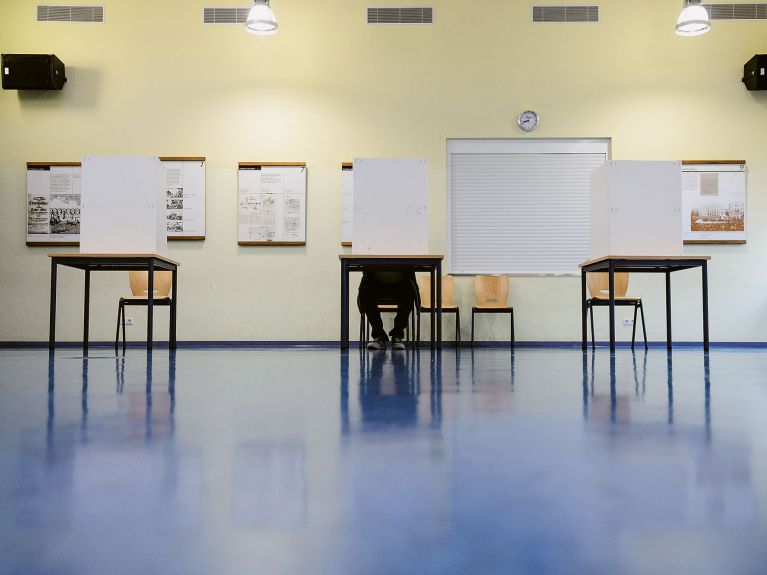The citizen is sovereign
The right to vote is considered democracy’s highest good.

It was Barack Obama who coined the widely known adage that elections alone do not make true democracy. Wise words indeed – and nonetheless: the right to vote is considered democracy’s greatest good. In the personal perceptions of individual citizens, voting probably even constitutes their main act of participation in democratic government. The framework for this participation is laid down in the Basic Law. It defines the principle of representative democracy as the state order of the Federal Republic of Germany. This means: the people does not exercise state authority directly, but transfers it to elected bodies – parliaments. The Bundestag, or federal parliament, in Berlin is the parliament for the whole country. Then there is a Landtag, or state parliament, for each of the 16 German states, while in districts, cities and municipalities there are local bodies of self-government. These parliaments are the only constitutional bodies in Germany that are directly voted for by the electorate.
Democracy involves government for a specific period of time. Municipal elections in Germany are held every five years. The same interval separates the Landtag elections that determine the composition of state parliaments (with the exception of Bremen, where state elections are held every four years). As a result of Germany’s federal structure, the 16 states have considerable autonomy, especially on matters relating to the police, justice, education and culture, which gives state parliaments significant freedom of movement and offers a wide range of opportunities for involvement in policymaking at the federal level.
The Bundestag in Berlin, on the other hand, is elected every four years in free, secret and direct elections by citizens who are at least 18 years of age and eligible to vote. The turnout for Bundestag elections is traditionally high and rather respectable when compared with that in many other countries. Nevertheless, the percentage has been gradually declining since the 1970s. In 2017, for example, 76.2% of 61.5 million eligible voters went to the ballot box, compared with a 91.1% turnout in 1972.
The Bundestag is elected on the basis of a slightly modified personalised system of proportional representation, in which half of the minimum of 598 seats are allocated by votes cast for candidates in the 299 constituencies (first votes) while the others are selected by votes for the respective state lists of the political parties (second votes). In concrete terms, this means that every eligible voter has to cast two votes on election day. The first vote is given to a candidate of a political party in the local constituency, while the second vote is cast for the state list of candidates of one political party. The subsequent total number of seats in the Bundestag depends on the number of valid second votes cast. The number of members can increase (significantly) as a result of so-called “overhang” and “balancing” seats. With 709 members, the present Bundestag is the largest in the history of the Federal Republic of Germany.
Here are a few more numbers: since its first session in Bonn on 7 September 1949 the Bundestag has sat 4,215 times. The total sitting time amounts to 29,104 hours, and the speeches presented during that time fill 345,520 pages of stenographic reports. A total of 4,072 deputies have come and gone. In all, they have passed 64,078 laws. In addition to the election of the Federal Chancellor, law-making is the most important duty of the parliament, which regards itself as a working parliament.
The system of personalised proportional representation also influences the nature of German parliaments, because it means smaller parties are represented in accordance with their share of the vote. This electoral system makes it difficult for a single party to form a government alone, so that as a rule an alliance of parties forms the government in Germany. That is why since 1949, with one exception, the Federal Government has been formed by coalitions of several parties that competed against one another in the preceding election. To prevent a fragmentation of the political landscape in parliament and simplify the formation of a government, parties must receive at least 5% of the votes cast (or three directly elected constituency seats) to be represented in the Bundestag. Seven parties are now represented in the 19th German Bundestag: CDU, CSU, SPD, AfD, FDP, The Left and Alliance 90/The Greens.
In any event, the political parties play a key role in the German electoral system. The Basic Law gives them the task of participating in opinion formation. As a result, the nomination of candidates and the organisation of election campaigns acquires the status of a constitutional duty. The organisational structure of political parties must follow democratic principles, and political parties are expected to commit to the democratic state. Parties whose democratic ethos is in doubt can be prohibited on the application of the Federal Government. However, any such ban can only be issued by the Federal Constitutional Court.
Essentially, the parties continue to reflect society, although the traditional large broad-based parties, the CDU and SPD, in particular have been losing members and cohesive force for some years. Smaller parties often have greater appeal, and social media are becoming increasingly important as platforms for political expression and action. Furthermore, many citizens also increasingly desire more opportunities for participation through elements of direct democracy and plebiscites.
You would like to receive regular information about Germany? Subscribe here:


